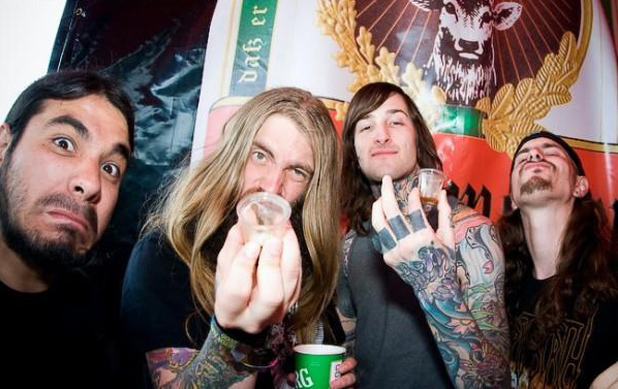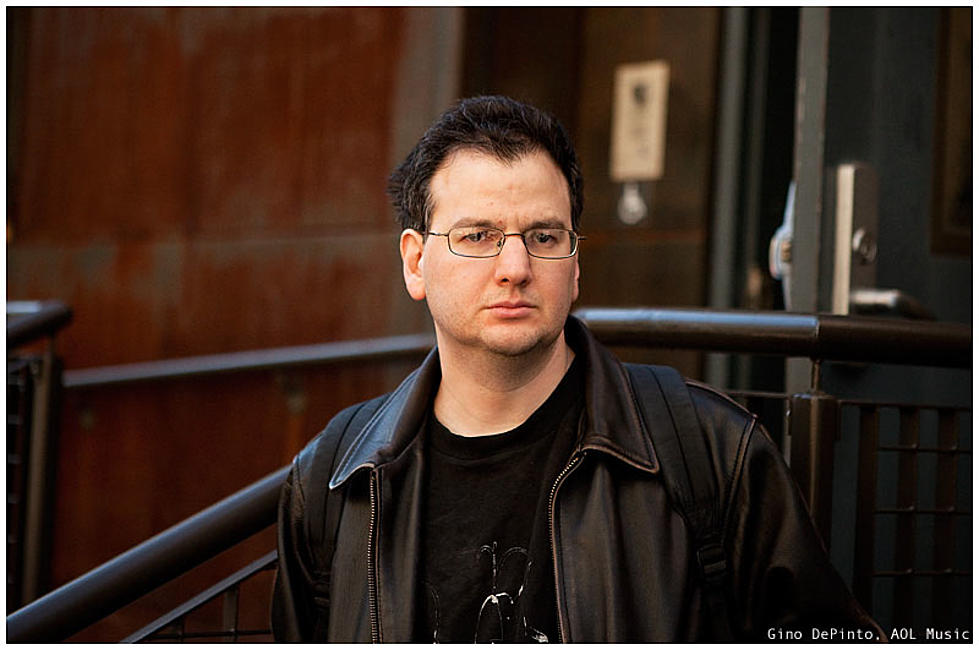Interview: Mark Heylmun and Chris Garza of Suicide Silence
All the latest guitar news, interviews, lessons, reviews, deals and more, direct to your inbox!
You are now subscribed
Your newsletter sign-up was successful

It wasn’t being tagged the forerunners of deathcore that inspired Riverside, California, band Suicide Silence to step up their game for their new record, The Black Crown.
It was more of an internal awakening, a realization that in order to remain satisfied as musicians, they had to spend more time on their songwriting and step outside their comfort zone.
Sure, there are plenty of tremor-inducing breakdowns and blowtorch death metal riffs on the new album, but it’s what’s between the blast beats and the mosh parts that makes The Black Crown a developmental leap over 2009’s No Time To Bleed.
Not only did guitarists Mark Heylmun and Chris Garza spend more time writing riffs, they came up with an abundance of material during that time and only kept the best.
In addition, they weren’t afraid to wear their influences on their tattooed sleeves, combining everything that’s inspired them as players into their own demolition soundtrack.
Guitar World talked to Heylmun and Garza about the creative process for The Black Crown, the raw power of simplicity, the challenges and rewards of working with producer Steve Evetts and the physical obstacles they’ve encountered over the past year.
GUITAR WORLD: When did you start working on songs for The Black Crown?
All the latest guitar news, interviews, lessons, reviews, deals and more, direct to your inbox!
MARK HEYLMUN: For me, it really started in December 2009 when we were on tour with Megadeth. That’s when I started really thinking about riffs and how I was picturing the record. Even though it wasn’t even started, I thought about how it would be when it was finished and what we were gonna do to start writing.
I suggested to the guys that we go up to a cabin and rent it for a couple weeks and be away from everything and get all of our idea on the table whether they’re good or bad and see where everyone’s head is at. And that happened between December of 2009 and February 2010
CHRIS GARZA: We were all pretty fresh. I didn’t have any riffs. We would just jam all day. A lot of it turned out to not even make the record, we were just jamming to get the juices flowing.
MH: Yeah, at the time I didn’t have even 30 seconds or a minute of actual music. It was more the idea of how the songs would be and how the structures would be and how we were gonna grow from the last record. I had some riffs I thought were cool. We wrote a couple songs but none of ‘em made the final product. It was more of a thing to get back in the groove of writing, since we hadn’t written anything together in a year and a half. And it was also the first time we were writing with our new bass player [Dan Kenny]. So we just went in and jammed to see what came out spontaneously which is the way we wrote the first two records.
How was the writing process different this time?
MH: We wrote in a completely different way. Dan was in San Francisco, so whenever he was down south in Southern California where the rest of us live we had a writing session together, but it was mostly Chris and I jamming out hours a time at his house. We knew what we were writing had less filler and less fat. There was definitely less overthinking and more just doing it and being happy with what were doing.
Were there different influences at play this time?
MH: Well, we weren’t afraid to show where we have come from so you can see the influence of Korn, and things like Suffocation, Morbid Angel and Pantera. And even the lead playing that I do, there are slight little slivers that come through that are kind of like Opeth -- just things we would have been more afraid to do previously.
There are still plenty of breakdowns, but they feel more inspired.
MH: I think we want to do breakdowns because they’re really fun, and at the end of it all the music has to be fun or else it’s not gonna be cool to go on tour and play every day. And it still is. If we went in to write and not much was happening, we could still go on a half-time drumbeat and jam on that for a half hour and listen to what we’d played, and something in there usually turned out to be a good breakdown or it would morph itself to something that would be a good breakdown. We just still want to write stupidly heavy breakdowns that just give you the feeling of, “What the hell!” Or, “Oh my God, this is so simple and heavy, why didn’t I write this?”
Breakdowns are not necessarily a way to showcase your skills, it’s just a way for the band to come through and show how heavy we can be.
CG: Yeah, whenever we were jamming to a simple groove, the way it seems like best ones came out was when Mark or I would play something and then we’d just start laughing because it was like, so heavy.
Many death metal musicians try to write challenging songs that are hard to follow. No matter how many rhythm and tempo shifts you guys have, it seems like the music is still primal and raw.
MH: For us, it has always been about not trying to go over people’s heads. We’re musicians that are semi-lazy. We don’t want to go up there and have to think too hard. The way I always thought of music was that musicians shouldn’t have to think. You should just go with it and just play.
There are more guitar solos on this record than you’ve previously played.
MH: I’ve always been able to play leads, but we never rely on them. If there’s something cool that we write that calls for one then I’ll play it. It just seemed to come out more on this record because we were trying to do more diverse stuff on it.
Machine produced your last album, No Time To Bleed. Steve Evetts produced the new one. What did he bring to the table that Machine didn’t?
MH: Steve is just a completely different kind of producer. He’s real good at getting a feel for the bands he works with and doing everything real organic. Machine had everything computerized and digitized. It was cool, but with Steve we only used real amp tones.
Everything that’s on the record is all amps that we had at our disposal, and it was mainly our live rig. That was a relief and something a lot of bands in our genre aren’t doing right now. Everyone’s got their Axe-FX or their Pods, or just goes straight in Amp Farm or whatever they’re using to make a tone that sounds good for a recording. But we did it and used all of our actual live tones, which felt really good when we recorded it and made it easier to reproduce live.
Any obstacles along the way?
CG: There were times I would play something completely perfect and Steve would say, “No, do it again,” because it didn’t feel right. That was frustrating. But when you got the take you wanted, you heard how much better it was when it had more feeling. Also, during the last five days of tracking my head started being a little more quiet and then it just blew. But the day it blew out was the day we finished tracking.
Were you guys all getting along during the writing and recording of The Black Crown?
MH: We always get along to an extent. Whether or not we’re extremely mad at each other we can still be rational and talk to each other about it. But I don’t think any of us really like to be mad at each other. We don’t like to let it get out of hand like it sometimes does.
When was the last time a situation got out of hand?
MH: [Vocalist] Mitch [Lucker] and Dan Kenny were really drunk and they ended up getting in a fight. But they didn’t really punch each other. They just wrestled and threw shit at each other. And then Dan went outside punched the trailer and sprained his hand. It was funny because around the same time I sprained my thumb really bad so during the last two weeks of Warped Tour my right thumb was so swollen I could hardly grip my pick.
Dan and I were playing with our right hands like wusses. I couldn’t do pinch harmonics. I could hardly do anything. I don’t know how I came through it, but it taught me a little bit more about being consistent in whatever way I’m playing. I hadn’t played lightly and keep the consistency in my playing going. And once my thumb got better I thought, “You know what? That actually helped me a lot ‘cause now I can not just get super agro and hit the guitar really hard, but I can also he heavy with a light touch.
How did you sprain your thumb?
MH: I was air drumming to that Rammstein/Meshuggah mash-up “Benzene.” And I was drunk on [malt beverage] Four Loko, and I was air drumming out of control and then I started using our guitar tech as a symbol. My thumb was poking out a little bit and I caught his kneecap with the tip of my thumb and it jammed it and bent it back. It swelled up and turned all purple.
So, can we still call Suicide Silence a deathcore band?
MH: It doesn’t matter to me anymore what people call us. It kind of was weird at first just ‘cause it doesn’t sound cool and where we come from isn’t just straight death metal and hardcore. we will outlast the deathcore genre just as Korn and Deftones and Slipknot have outlasted the nu-metal genre.
This month, Guitar World invites you to ask Suicide Silence's Mark Heylmun and Chris Garza anything you want! Just email your questions to dearguitarhero@guitarworld.com and put "Suicide Silence" in the subject line. Remember to include your name in the e-mail body, so you can get credited in the magazine -- and impress and annoy your jealous friends!
For more about Suicide Silence, check out the September issue of Guitar World, on sale July 19.
Jon is an author, journalist, and podcaster who recently wrote and hosted the first 12-episode season of the acclaimed Backstaged: The Devil in Metal, an exclusive from Diversion Podcasts/iHeart. He is also the primary author of the popular Louder Than Hell: The Definitive Oral History of Metal and the sole author of Raising Hell: Backstage Tales From the Lives of Metal Legends. In addition, he co-wrote I'm the Man: The Story of That Guy From Anthrax (with Scott Ian), Ministry: The Lost Gospels According to Al Jourgensen (with Al Jourgensen), and My Riot: Agnostic Front, Grit, Guts & Glory (with Roger Miret). Wiederhorn has worked on staff as an associate editor for Rolling Stone, Executive Editor of Guitar Magazine, and senior writer for MTV News. His work has also appeared in Spin, Entertainment Weekly, Yahoo.com, Revolver, Inked, Loudwire.com and other publications and websites.

